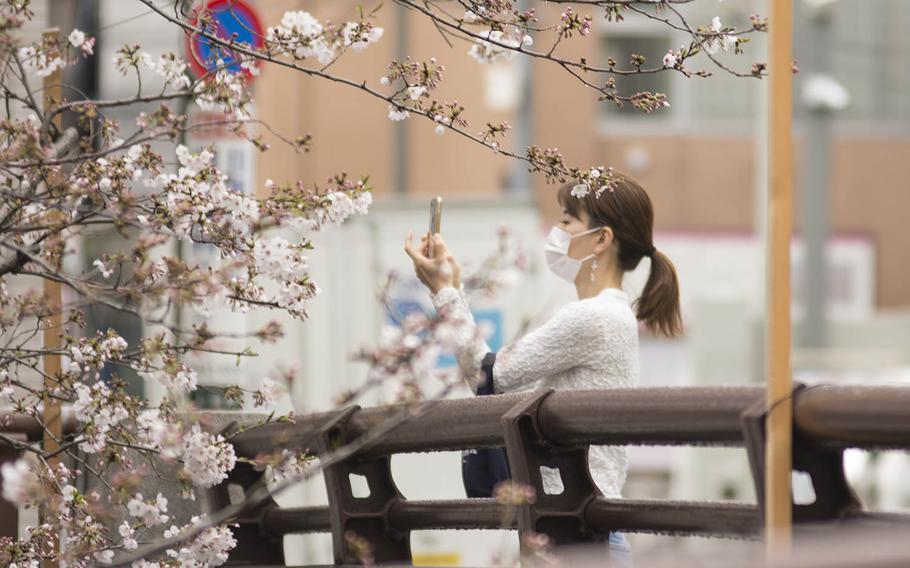
A woman photographs cherry blossoms along the Meguro River in central Tokyo, Monday, March 23, 2020. (Akifumi Ishikawa/Stars and Stripes)
Stars and Stripes is making stories on the coronavirus pandemic available free of charge. See other free reports here. Sign up for our daily coronavirus newsletter here. Please support our journalism with a subscription.
TOKYO — The Tokyo Metropolitan Government is cautioning visitors to city parks to set aside tradition to avoid the threat of coronavirus as they enjoy the iconic, seasonal Japanese cherry blossoms.
Nonetheless, throngs of visitors gathered beneath the cherry blossoms in Tokyo city parks over the weekend. Of those that turned up Sunday in Ueno Park, where more than 3 million took part in cherry blossom season last year, many came wearing surgical-style face masks.
The advent of sakura, or cherry blossoms, came early this year, on March 14, thanks to temperatures more like May than March, according to the Japan Meteorological Agency. The height of the bloom occurred Sunday.
In early March, the Tokyo government called on visitors to refrain from having hanami picnics in city parks to combat the spread of coronavirus. Hanami is Japanese for flower viewing, a pastime tied to cherry blossoms. It’s one of the most popular seasonal events in Japan, where picnickers welcome spring beneath blooming trees in parks and other public spaces.
As of Sunday, Japan has counted 1,046 confirmed cases of coronavirus and 36 deaths, according to World Health Organization. Friday, the U.S. Centers for Disease Control and Prevention heightened its travel advisory for Japan to level 3, or “avoid nonessential travel.” Japan is experiencing a “widespread ongoing transmission” of coronavirus, according to the agency.
At Ueno Park, the city taped off areas along a main road, which is usually set aside for picnics and parties. Signs and loudspeakers carried messages urging people to refrain from traditional hanami parties. And park officials and security guards patrolled the park carrying the same message.
“Please cooperate and refrain from putting out picnic sheets and having parties where you eat and drink in groups during the cherry blossom season,” the posted notices stated.
During cherry blossom season, visitors typically pack the parks so tightly that their tarps and blankets cover the ground with no space between them. Food, drink and revelry are the order of the day.
However, sitting close together in groups and sharing food and drinks carry a high risk of spreading the coronavirus, according to a notice on the metropolitan government website. It advised visitors to keep moving. On Sunday, long lines formed for soft ice cream and other food vendors.
“We hope you enjoy hanami while strolling,” the notice advised instead.
Many popular viewing spots in and around Tokyo have canceled cherry blossom festivals this year.
Lighting of cherry blossoms at Chidorigafuchi, the moats of the former Edo Castle near the Imperial Palace in central Tokyo, has been canceled.
Showa Kinen Park in Tachikawa, close to Yokota Air Base in western Tokyo, is also asking visitors to refrain from having hanami parties and will not be open for cherry blossom night viewing, according to the park website.
In Kanagawa prefecture, the sakura festival at Negishi Forest Park in Yokohama, scheduled for March 28, has been canceled. The Sankeien Garden in Yokohama has canceled its night viewing.
kusumoto.hana@stripes.com Twitter: @HanaKusumoto